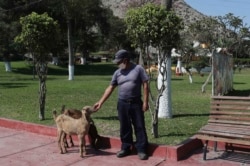And now, Words and Their Stories from VOA Learning English.
Relationships between people can be complex. So, to help there are some good rules to follow. For example, when dealing with people at work or with a friend, it is usually a good idea to stay calm and be easygoing.
Personal or working relationships can be damaged if you shout at other people or get angry with someone. This is especially true if that certain “someone” helps you in a meaningful way – like making sure you get paid!
To describe that situation, the English language has a very useful expression: to bite the hand that feeds you.
This phrase means that you act badly toward the person who is helping or has helped you. When you bite the hand that feeds you, you are being unthankful, ungrateful, unappreciative. And that is a lot of “un” words. In other words, you turn against, attack, and even harm someone who is helping you.
We often use this expression as a word of advice -- as in don’t bite or you should not bite the hand that feeds you.
Now let’s use it in an example.
Let’s say someone comes to your place of business and wants to buy something from you or even offer you a chance at a new job. But you, in return, are rude to that person. In that case, I could say to you: “You should not bite the hand that feeds you.”
This expression can also mean to turn against someone who helped you in the past. Used this way, you do not show respect for someone who has been there for you.
Some people say this phrase goes all the way back to ancient Greece. The poet Sappho was said to have used it over 2,600 years ago.
Other experts claim that one of Aesop’s Fables, called “The Gardener and His Dog,” shows an example of this expression.
The story goes something like this: A gardener’s dog was playing in a garden near a well and then fell in. The owner ran to help. He reached his hand into the well to pull out his dog. But as the man did this – the dog bit him on the hand!
“What very ungrateful behavior! I only came to help!” said the gardener. So, he left the dog and walked away.
The dog bit that hand that fed him. And that was a big mistake.
Here is another example.
Let’s say I am working as an interior designer. I go into people’s homes and decide how to improve them. I choose everything from wall paint and floorings to artwork, tables, and chairs.
Now, because I own my own business, my clients are very important to me. They are my ‘bread and butter,’ meaning my earnings are based on the money they pay me. If my clients are happy with my work, they will tell other people. And that word-of-mouth business means more work and more money for me.
But there is a problem: I have a difficult client. He is always changing his mind about design decisions and does not communicate well. So, small issues often become big problems.
What should I do? On one hand, I could tell him to find another interior designer. On the other hand, I could just find a way to work with him. If the economy is weak, it may not be a good idea to lose a client, even a difficult one. I decide to not bite the hand that feeds me and put up with the difficult client. If the economy improves, then I can show him the door!
And that’s our show for today. Try using this expression. Have you ever bitten the hand that fed you or perhaps someone bit your hand?
Until next time ... I’m Anna Matteo.
____________________________________________________________
Words in This Story
ungrateful – adj. not feeling or showing thanks for favors, help, gifts, etc.
unappreciative – adj. not giving recognition or thanks for something
rude – adj. not having or showing concern or respect for the rights and feelings of other people : not polite
gardener – n. one who spends time cultivating plants and tending a garden for pleasure or recreation
client – n. a person who uses the professional advice or services of another
word-of-mouth – adj. oral communication
show someone the door – slang expression to rid of someone quickly and without concern






